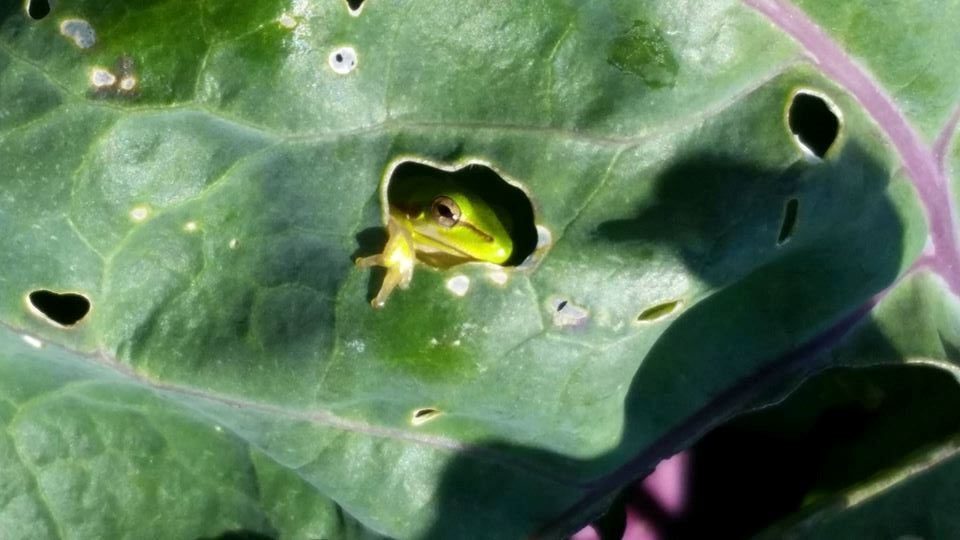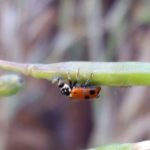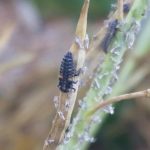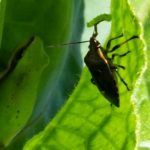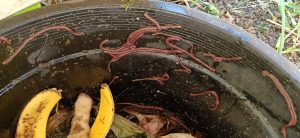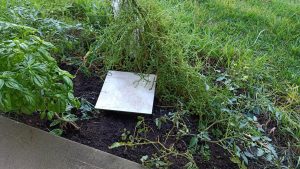I love encouraging the good guys into my garden. So while others are searching for ways to exterminate the pests in their veggie patch, I am watching as the aphids increase in numbers on my mustard plant, or the caterpillars of the cabbage white butterfly munch away on my broccoli and I patiently await the arrival of the predatory insects. But before your good guys will come to dinner they need to have an invitation – and that invitation is FOOD. If you are killing off all their food source (ie. the pests) – then they will never arrive. It doesn’t take long in my garden because I never spray pesticides or go to war on the bad guys, which ensures I always have a supply of food for my guests – and they are never far away. Also, the pests tend to attack the weaker plants – so it will be the lonely plant that has self seeded away from the rest of the garden bed and in poor soil which will attract pests. These plants become my sacrificial trap plants.
To many gardeners the mention of the word “insects” is reason to cringe and reach for the chemicals. But the truth of the matter is that more than 97% of insects are either beneficial to your garden or benign. That leaves less than 3% which are garden pests.
So when you reach for that chemical to rid yourself of that pest in the 3% range – what else are you killing? All the beneficial insects! The insects that pollinate your vegetables, seek out and destroy your harmful pests, aerate your soil, compost your organic matter, provide food for wildlife, and bring beauty and “buzz factor” to your backyard.
Why not make your job easy and let Mother Nature do your work for you? Attract the good bugs into your garden. If you can provide what they need for their entire life cycle they will quite happily make your backyard their permanent home. Below are a few tips for doing just that.
KNOW THY ENEMY
Recognise which insects are helpful and which ones are harmful. Identify your foe and find your ally. Research what you can do in your garden to encourage your good bugs.
GIVE THEM SOMEWHERE TO HIDE
While your good insects will patrol your plants all day long feeding on your pests, they still need somewhere to hide at night – and the nocturnal pest patrol will need somewhere to hide during the day. Your helpful insects will need somewhere to rest, overwinter, and breed. Give your garden helpers hiding spots – stepping stones, rocks, or mulch. An “Insect hotel” is an amazing addition to a garden and provides a great variety of spots for various types of beneficial insects to hide and breed.
GIVE THEM SOMETHING TO DRINK
Insects need to drink to stay alive so make sure that there is adequate water for your helper bugs to drink in your garden. If you already have a sprinkler system in place, the puddles from that should be enough. If you leave out any small bowls of water, change the water regularly so you do not breed mosquitoes, and places rocks or sticks in the bowl so your insect buddies do not drown.
GIVE THEM SOMETHING TO EAT
You can lure beneficial insects into your garden by planting their favourite plants amongst your regular plants or veggies. Some great choices are things like yarrow, coriander, dill, fennel, sunflower, alyssum, and parsley – but there are many more as well. By planting these plants alongside your regular garden plants, your beneficial insect friends will already be there to protect your garden.
GIVE THEM SOMEWHERE TO BREED
An insect hotel is a lovely addition to any garden. They can be as simple or as elaborate as your heart desires.
BUILD IN DIVERSITY
Creating a diverse garden will make sure that there is a broad range of plants which is more likely to create a healthy ecosystem supporting a great number of beneficial insects and predators. If similar plants (say, all your tomatoes) are spread throughout your garden rather than grouping them (as is often the way in the modern vegetable plot) then we find that the bad bugs have less of a chance to take hold – the pests have a harder time locating their preferred plant to feed on (hidden amongst your other garden plants), or if they do find one plant the chances are that the pests will be preyed upon by your good guys before they can find your next plant. No more providing them with a smorgasbord of delights as they munch their way from one end of your neat little row of tomatoes all the way to the other end.
AVOID CHEMICAL WARFARE
What happens when you apply pesticides is that you kill off the good bugs as well as the bad – this leaves a garden unprotected with no beneficial insects and is an open invitation for the bad guys to move straight back in unchallenged. Pest insects generally build up in numbers far more quickly than the good guys, but if you have already set the stage for the beneficial insects to be present in your garden then they will very quickly come to your rescue. Another problem with the use of pesticides is that more and more insects are showing a resistance to the chemicals. This will eventually render them useless.
DON’T USE INDISCRIMINATE INSECT KILLERS – EVER!
If you use a bug zapper light you might want to rethink that idea. Research shows that even if a bug zapper is not technically IN the garden, it can harm many of the garden’s insects. Research also shows that the bugs that are most often killed in bug zappers are beneficial insects and not the harmful ones. The same is true for those yellow sticky strips that you can buy to hang around your garden. Most of the bugs you will kill are the good guys!
KEEP YOUR SOIL HEALTHY
Pests and disease hit weak and unhealthy plants the hardest. If you keep you soil in tip-top shape then your plants will be the strongest they can be and will be less susceptible to pests. Beware, however, of giving a plant TOO MUCH Nitrogen as this can cause soft and sappy growth – which the sap sucking insects adore.
KEEP A RECORD
Keep records of the pests that have invaded your garden and when. You can be better prepared in future years to keep a look out for these pests and get them under control BEFORE they are out of hand.
ONE FINAL THING
Don’t just think of the beneficial insects. We have so many other little garden helpers and you need to provide for their needs as well. Thick, thorny shrubs for small birds; logs and sunning rocks for lizards; bat houses for insectivorous bats; ponds and hiding places for frogs; and water for all of them….
Make a home for them and, I promise you, they will come!
Now run outside and create your oasis!
Jo

